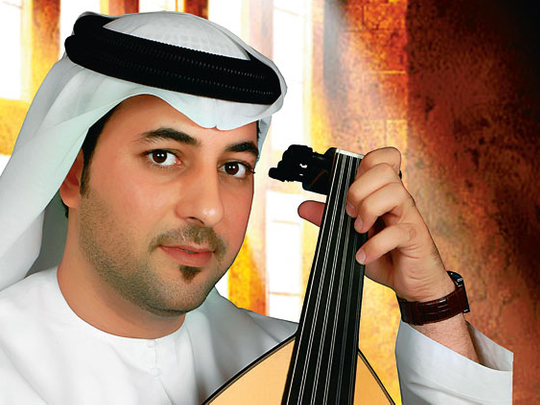
Preserving and developing the UAE’s musical heritage is the mission of a Fujairah-based oud player’s life, who has been living for and breathing music since he was a child.
“Ever since I could remember, I had one interest in life which is music, and especially our musical heritage, which is facing the risk of extinction,” says Emirati musician Ali Obaid.
As part of his efforts to develop the UAE’s heritage, Obaid set up the Eastern Orchestra, the first of its kind in the UAE. “I always wondered why we didn’t have such a band in the UAE, unlike other Arab countries such as Egypt, Iraq and Syria,” he says. “It was my dream since I was 13 years old, and after I joined Bait Al Oud [house of oud] from which I graduated, I started meeting many musicians, and making my dream come true,” he adds.
The band started with two people, Obaid, the oud player, and another musician who played rababa, a single string Arabian instrument. “There was never an oud-rababa duet before I introduced it. I was worried that the rababa music was about to become extinct, as very few musicians play it,” he says. There is a yearly rababa festival held in Fujairah, and it is quite conspicuous that all players are from the Arab world, but none from the UAE, Obaid remarks.
The band has performed in many festivals and cities around the world including Montreal, Seoul, Baalbeck and Paris. “We work with Rouh Al Shark orchestra led by Iraqi oud master Naseer Shamma, who is my teacher, and although we work together quite often and have the same goals in mind, we see things from a different perspective. Our work complements each other’s,” Obaid says.
After having held four concerts in Abu Dhabi in November, the orchestra will take off to New York, where it will represent the UAE in the opening of the Shaikh Zayed Museum.
Obaid plans to launch an album as soon as he completes work on a few pieces. “I take traditional pieces from the UAE and tweak them to make them more modern and much more interesting to foreign listeners, because our traditional music can be too heavy on the unaccustomed ear,” he says.
Although he had composed a few songs, Obaid can see himself more in pure music than songs. “It is much more difficult to compose music than write a song, because in a song you have lyrics and music, and if one is weak, the other can help, but in musical composition, your music has to be very good or else you fail,” he says.
As for his own favourites, Obaid says he listens to musicians and singers from all over the Arab world as well as Turkish musicians.
“From Iraq, there is Munir Basheer, Jamil Basheer and Naseer Shamma, I also love to listen to the works of Egyptian composer Riad Al Sunbati and Lebanese singer Fairuz, although they are all from different schools,” he says.












